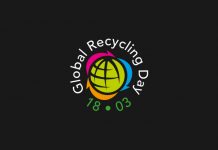The Global Recycling Foundation salutes designers showcasing the use of recycled textiles at London Fashion Week, in advance of Global Recycling Day on 18 March.
As sustainability and positive fashion continues to gain prominence, designers are embracing calls for more brands to re-think their designs to minimise their impact on the environment. New textile production is a major contributor to climate change: the Ellen MacArthur Foundation estimates that the fashion industry accounts for some 10 per cent of global carbon emissions – more than the aviation and maritime industries combined. Forward-thinking designers are encompassing textiles made from recyclables into their collections.
One such clothing brand being showcased at this year’s digital London Fashion week is Bethany Williams. Each garment is made from recycled and organic materials and made in the UK, working along with social projects and local manufacturers on the production. Bethany Williams said: „Researching and exploring waste streams within the UK, finding how we can innovatively recycle different materials is something that fills us with so much joy. Designing has always felt like a form of problem solving, something that enables us to find a solution to how we can reuse a product, material or garment that has lived through its original purpose, and then be reworked to give it a second life.”
These sentiments are echoed in other LFW collections including N Palmer, a brand launched in summer 2020, which explores repurposing vintage fabrics through innovative textile techniques and contemporary design. Nicholas Palmer of N Palmer said: “In 2021 with all the information about waste and pollution the fashion industry is responsible for, I couldn’t in good conscience not implement recycling/upcycling solutions into my brand. It’s too self-indulgent to create things now without considering the entire lifecycle of a piece.”
One of the oldest and most established sustainable industries
Textile reuse and recycling is one of the oldest and most established sustainable industries: textiles have a higher percentage of re-use (50-60%) than most other waste streams. Mariska Zandvliet, President of the Textile Branch of the European Recycling Industries Confederation (EuRIC) commented: “From the point of view of our industry but also in line with the waste hierarchy, re-use is essential and should always come before recycling. Currently less than one per cent of the post-consumer textile is recycled into fibres and used in new clothing. Designs using multiple layers and mixed materials make it difficult to separate the fibers for recycling at end of life. Therefore, most of the recycling is still mechanical which shortens the length of the fibers making them unfit to be used again without adding virgin material. Through innovative recycling techniques, co-operation, eco-design and creating a demand for recycled fibres new business models will arise allowing the textile chain to become circular.”
One innovative new textile trend is the use of polyester made from recycled plastic water bottles. This is possible because polyester and plastic bottles are both made from polyethylene terephthalate (PET). The Global Recycling Foundation wishes to showcase the brands and designers pioneering the positive and sustainable side of the fashion industry. Ranjit Baxi, Founding President of the Global Recycling Foundation, commented: “Every year on Global Recycling Day we applaud the innovative recycling practices of our heroes and report what they have achieved to our millions of supporters around the world.” It hopes designers will be nominated for its #RecyclingHeroes competition to mark Global Recycling Day on 18 March and gain the recognition they deserve.
Nominations for the award of Recycling Hero 2021 should be sent to info@globalrecyclingfoundation.org – entries close 8th March 2021.
Source: Global Recycling Foundation







